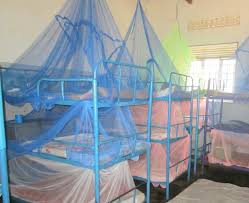Mosquito nets
Health experts are worried about the quality of mosquito nets sold on the market.
The experts say that the 2018 World Health Organization approved mosquito nets are only able to offer protection against malaria for two months, after which they are likely to become ineffective.
According to the scientists, the mosquito nets have low contents of the chemical piperonyl butoxide (PBO) which is infused into pyrethroid mosquito nets to make them more effective in killing mosquitos that land on the nets.
The PBO is supposed to help pyrethroid resistance that has been reported in some parts of the world, Uganda included. The scientists now say that the only approved WHO pre-qualified nets on the market have a low PBO content of 2 milli-litres, which offers optimal protection for two.
This they say is not ideal for countries like Uganda that need nets that offer protection for at least one year.
Dr Myers Lugemwa, a malariologist and official from the Malaria Control Department says the UN health agency needs to re-assess the two qualified long-lasting nets before the next procurement of mosquito nets for the national campaign.
He says since the country normally uses WHO qualified drugs or mosquito nets, it is likely that the next procurement of long-lasting mosquito nets will include the nets that have low PBO content.
According to Lugemwa, the current mosquitoes nets that were distributed during the just concluded mass mosquito net campaign had 10-25 milli-litres of PBO.
These amounts he says can last for at least 2 years (24-30 months), compared to the recently approved nets that have 2 ml which scientists estimate can only be effective for two months.
He says as Uganda prepares to undertake another mosquito net campaign, assessment into PBO nets needs to be carried both locally and internationally so that appropriate nets are bought.
“It would do us no good to procure nets that protect people physically and yet they do not offer any protection against malaria. We would be like drunkards buying beer that cannot make you drunk,” Dr Lugemwa said.
Dr Joanitar Nankabirwa, a malariologist and researcher with Infectious Disease Research Collaboration-IDRC says if mosquito nets with low abilities to protect persons are procured, this will worsen their ineffectiveness. Currently, research shows that other methods of vector control such as Indoor Residue Spraying are 50 percent more effective in controlling malaria compared to mosquito net use.
“We know that mosquito nets are not very effective in fighting malaria because they depend on the people using the nets. In such a situation, it would be better to have effective nets that offer protection for long so that the few people that use them well are protected,” Nankabirwa said.
The government every three years has embarked on a nationwide mass mosquito net campaign aimed at reducing the prevalence of malaria in the country that now stands at 9 percent. The campaign is hinged on people using mosquito nets that protect them from being exposed to malaria infections. If low-quality jets are procured, mosquito net users will only be protected for a short time.
Dr Jimmy Opigo, the assistant commissioner of the national malaria control programme says that there’s nothing to worry about at the moment as far as PBO content is concerned.
He said the government will carry out the necessary assessment when the time comes to procure more mosquito nets.
“PBO contents are an issue that we shall take seriously because we want nets that offer longer protection. And as we are procuring tests for the next mass distribution, these are things that we shall consider and look into. But for now, all the nets we have distributed in the country can offer protection for over a year,” Dr Opigo said.
-URN





